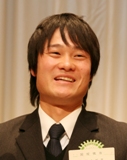��What I learned through wheelchair tennis��
December 3, 2008
Mr. Shingo Kunieda,
Gold Medalist in Wheelchair Tennis at the Beijing Paralympics,
Reitaku University
 ��One rule in wheelchair tennis is that the ball is allowed to bounce up to two times. This is the only difference in the game from ordinary tennis. The size of the court and the height of the net are the same and the tournaments are managed by the International Tennis Federation (ITF), which also manages ordinary professional tournaments. There are over 130 wheelchair tennis tournaments held each year throughout the world.
��One rule in wheelchair tennis is that the ball is allowed to bounce up to two times. This is the only difference in the game from ordinary tennis. The size of the court and the height of the net are the same and the tournaments are managed by the International Tennis Federation (ITF), which also manages ordinary professional tournaments. There are over 130 wheelchair tennis tournaments held each year throughout the world.
��Before I was afflicted with a spinal cord tumor when I was 9 years old, I was a baseball enthusiast and belonged to a local boys�� little league baseball team. After I was forced into life in a wheelchair, my mother, whose hobby was tennis, wanted her son to play the game, and took me to a tennis court. That event generated my interest in tennis. I was 11 years old when I came to know wheelchair tennis.
��When I was in my first year of senior high school, I travelled abroad for a match for the first time. Watching the top players of the world play was beyond my imagination. I remember thinking, ��I cannot compete with them, I can never reach their skill level��. When I look back at the level of effort I had been putting out at that time, I realize how half-hearted I was.
��Two years later, I began to practice in earnest, when I beat out a candidate for the Athens Paralympics. From that moment, I began to consciously think about the Paralympics. By having a clear set of goals, I was able to get fully into my practice. My improvements since then have been beyond what I had imagined. The gap from the world��s top level players began to shrink and I was able to beat them in due course. I learned that no matter how big the dream, do not give up right from the start, but first give it all you��ve got, because that is what is important.
��It doesn��t matter what it is, if you do not set a dream or an objective clearly for yourself, there is a limit to how much you can grow. In my case, it was the dream of gold at Beijing and achieving backhand top spin, a feat that no one in the world has been able to achieve, which motivated me to practice. The important thing was to imagine myself everyday after mastering an item. ��If I perfect this shot, I can achieve a new level in tennis�� and just by thinking this, I can concentrate on repetitive practice of the basics. A dream, the setting of objectives, and image of oneself succeeding, these are the keys to sustain motivation.
��After having won the gold medal at Beijing, I am often asked what my next objective is. I thought that winning gold was enough, but the expectations of those around me were greater than I had imagined.
��Ordinary sporting events for the disabled do not attract much attention, but everyone knows of the Paralympics. The athletes�� obsession is at a different level from other events. The level of stress rises and much drama unfolds. On such a stage, the excitement felt each time one wins a round to the next is a new sense of spiritual elevation. I want to feel that sensation again 4 years from now. My next target is the 2012 Paralympics.
��My other dream is to ��play in front of 1,000 or 2,000 people in Japan also��. If I can realize this, others who have disabilities may emerge wishing ��I too want to get up on that stage��. There may be others who will want to play wheelchair tennis.
��I have come to think that the first step to large shouts of joy is to have others feel, ��I want to see Kunieda��, and I want to challenge myself to elevate my game.
��That today I can challenge my dreams and targets is because I have a disability. I have come to think that way. The spinal cord tumor I contracted is a disease with a high rate of fatality. That I am able to feel happiness and feel thankful is a source of strength for me. Precisely because I know the preciousness of life, I can aggressively challenge the things I want to do. I feel challenge is the true fruit of life, and the reason I feel fulfillment in my life is something that I was able to enjoy because I was bound to a wheelchair. I want to continue to hold challenge as my motivation for living, and continue to play.